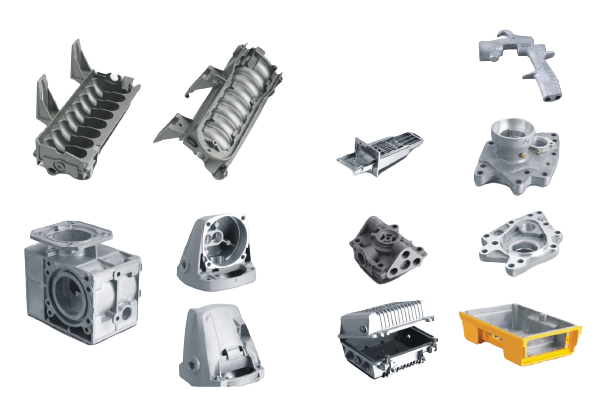Alcast Company for Dummies
Alcast Company for Dummies
Blog Article
The Basic Principles Of Alcast Company
Table of ContentsAlcast Company Fundamentals ExplainedThe Main Principles Of Alcast Company Alcast Company Fundamentals ExplainedThe Only Guide to Alcast CompanyAlcast Company Can Be Fun For EveryoneSome Known Details About Alcast Company
The refined difference depends on the chemical content. Chemical Comparison of Cast Aluminum Alloys Silicon advertises castability by minimizing the alloy's melting temperature and enhancing fluidness during casting. It plays a vital duty in enabling elaborate mold and mildews to be loaded properly. Furthermore, silicon adds to the alloy's strength and use resistance, making it important in applications where sturdiness is vital, such as vehicle components and engine elements.It also enhances the machinability of the alloy, making it much easier to process right into ended up items. In this way, iron adds to the total workability of aluminum alloys.
Manganese adds to the toughness of light weight aluminum alloys and improves workability (Casting Foundry). It is typically made use of in functioned light weight aluminum products like sheets, extrusions, and accounts. The presence of manganese aids in the alloy's formability and resistance to cracking throughout fabrication processes. Magnesium is a light-weight aspect that supplies stamina and effect resistance to aluminum alloys.
Rumored Buzz on Alcast Company
It allows the production of light-weight elements with exceptional mechanical homes. Zinc enhances the castability of aluminum alloys and aids manage the solidification procedure during spreading. It enhances the alloy's strength and hardness. It is frequently found in applications where intricate shapes and great details are necessary, such as attractive spreadings and specific vehicle components.

The key thermal conductivity, tensile stamina, return toughness, and prolongation differ. Select appropriate raw materials according to the efficiency of the target item created. Among the above alloys, A356 has the highest thermal conductivity, and A380 and ADC12 have the most affordable. The tensile limitation is the opposite. A360 has the very best return toughness and the highest possible prolongation rate.
The Alcast Company PDFs

In precision casting, 6063 is fit for applications where complex geometries and high-grade surface finishes are critical. Examples include telecommunication units, where the alloy's exceptional formability enables smooth and aesthetically pleasing layouts while maintaining architectural integrity. In the Illumination Solutions industry, precision-cast 6063 elements produce classy and efficient illumination fixtures that need detailed shapes and great thermal efficiency.
The A360 displays exceptional prolongation, making it optimal for complicated and thin-walled elements. In precision casting applications, A360 is appropriate for industries such as Consumer Electronics, Telecommunication, and Power Tools.
Alcast Company Things To Know Before You Buy
Its one-of-a-kind residential properties make A360 a valuable selection for precision spreading in these industries, boosting product resilience and high quality. Casting Foundry. Aluminum alloy 380, or A380, is a commonly made use of spreading alloy with several distinctive features.
In accuracy spreading, light weight aluminum 413 radiates in the Consumer Electronic Devices and Power Tools markets. It's generally used to craft complex components like smart device real estates, video camera bodies, and power tool housings. Its accuracy is impressive, with tight resistances as much as 0.01 mm, making certain flawless product setting up. This alloy's remarkable rust resistance makes it an excellent choice for outside applications, ensuring lasting, sturdy products in the pointed out markets.
Excitement About Alcast Company
The aluminum alloy you pick will significantly impact both the spreading process and the buildings of the final product. Because of this, you must make your decision very carefully and take an informed technique.
Identifying one of the most appropriate light weight aluminum alloy for your application will mean weighing a large range of features. These comparative alloy attributes comply with the North American Pass Away Spreading Association's guidelines, and we have actually divided them right into 2 groups. The first category addresses alloy attributes that affect the manufacturing procedure. The second covers attributes impacting the residential or commercial properties of the end product.
Some Known Incorrect Statements About Alcast Company
The alloy you choose for die casting directly affects a number of aspects of the casting procedure, like just how simple the alloy is to collaborate with and if it is vulnerable to casting issues. Warm breaking, additionally called solidification fracturing, is a typical die spreading issue for light weight aluminum alloys that can cause interior or surface-level tears or cracks.
Specific aluminum alloys are much more vulnerable to hot breaking than others, and your choice needs to consider this. Another typical defect discovered in the die spreading of light weight aluminum is pass away soldering, which is when the cast sticks to the die wall surfaces and makes ejection difficult. It can harm both the actors and the die, so you need to look for alloys with high anti-soldering buildings.
Corrosion resistance, which is already a notable characteristic of aluminum, can differ considerably from alloy to alloy and is a necessary characteristic to take into consideration depending on the environmental problems your product will certainly be subjected to (Aluminum Casting). Use resistance is an additional building commonly sought in light weight aluminum items and can set apart some alloys
Report this page